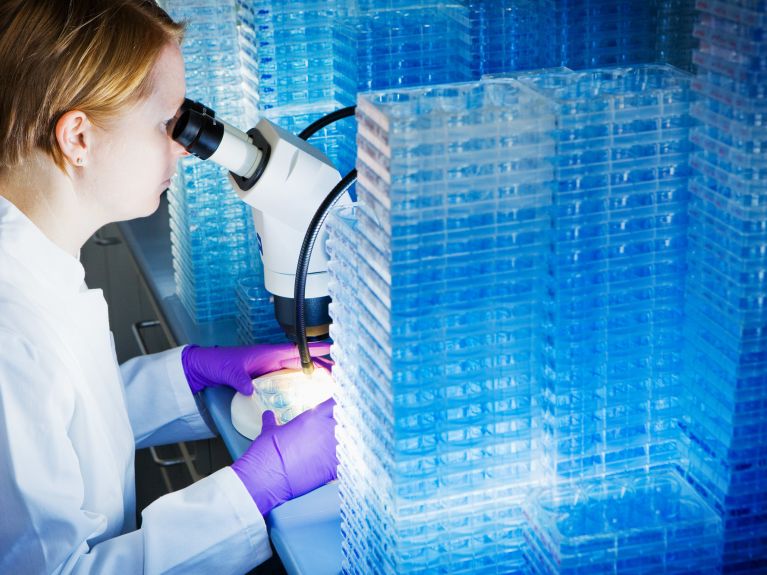Hope in the fight against cancer
New horizons in cancer research: three innovative approaches to therapy by scientists from Germany.

T cells attack tumours
Captain T Cell – the name sounds a bit like a super hero. But behind it lies a spin-off project at the Max Delbrück Center for Molecular Medicine in Berlin. The scientists surrounding project leader Felix Lorenz are placing an emphasis on highly active immune cells, so-called T cells. These are removed from the patient’s blood and then equipped with an artificial molecule in the laboratory. When returned to the body the enhanced T cells track down and destroy tumour cells. The Captain T Cell team is focusing on a particularly aggressive form of leukaemia and has developed a technology platform to optimize T cells. The research team won substantial funding in the Federal Ministry for Research and Technology’s biotechnology start-up initiative GO-Bio 2018.
Dieses YouTube-Video kann in einem neuen Tab abgespielt werden
YouTube öffnenThird party content
We use YouTube to embed content that may collect data about your activity. Please review the details and accept the service to see this content.
Open consent formThe right medication for each cancer patient
Every tumour is different, and the clinical picture varies in each cancer patient. The Biontech company in Mainz is involved in developing customized medications for individual cancer patients. Modern digitization and automation technologies are making it possible to produce personalized medications in sufficient quantities for clinical studies. This is the basic essential that has to be completed before the medication can be introduced into the market. The company surrounding its founders Ugur Sahin and his wife Özlem Tureci has convinced investors. At the beginning of January 2018 the company attracted the largest financing round ever for a German biotech company: 270 million US dollars.
Dieses YouTube-Video kann in einem neuen Tab abgespielt werden
YouTube öffnenThird party content
We use YouTube to embed content that may collect data about your activity. Please review the details and accept the service to see this content.
Open consent formPlasma pen combats cancer cells
Specialists in the field of plasma medicine are combining their skills at the Leibniz Institute for Plasma Science and Technology (INP) in Greifswald. A ‘plasma pen’ that was developed at the INP is already being used to treat wounds in cancer patients. Molecules are transferred to the patient via a small flame of around 40 degrees to successfully combat germs. Now the scientists want to look into the further potential of plasma applications: “Our aim is to eliminate cancer cells with the help of a highly compatible therapeutic method. At the same time we want to investigate how the body’s own immune system can be activated,” explains Sander Bekeschus from INP.
Dieses YouTube-Video kann in einem neuen Tab abgespielt werden
YouTube öffnenThird party content
We use YouTube to embed content that may collect data about your activity. Please review the details and accept the service to see this content.
Open consent formFurther information on cancer research in Germany: Deutsches Krebsforschungszentrum (dkfz) in Heidelberg



